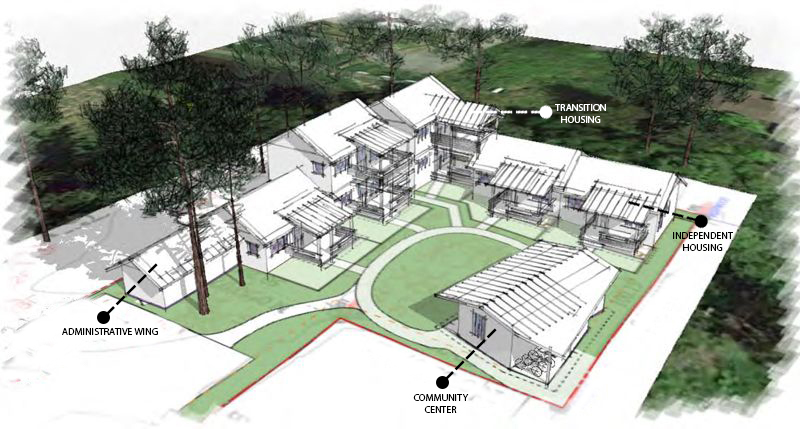A rendering of the new treatment center for children from 11 to 18 years old that suffer from the effects of sexual and cyber exportations
NIBLEY—The Malouf Foundation’s number one priority is fighting child sexual exploitation announced today they are planning to build a long-term, residential, therapeutic facility located in the Salt Lake area. The facility will be for for young female survivors of trafficking (ages 11 to 18).

The Foundation formally announced the aftercare center at the Golf for Freedom tournament on June 8th in Park City. Funds raised from the tournament will benefit the organization’s new initiative.
“The aftercare center will serve young female survivors across Utah and surrounding areas and will provide trauma-informed, holistic care on site,” said company spokeswoman Alicia Richmond. “Services will include medical care, clinical therapy, education and life skills training, faith support groups, and legal assistance. Currently, survivors can receive temporary support through a Children’s Justice Center or another community organization.”
The program is designed to provide the robust treatment survivors need to heal and reintegrate into society.
Malouf co-founder Kacie Malouf said the work at the Malouf Foundation realized the need for more comprehensive care for survivors of trafficking.
“With this new aftercare center, we want to address the entire scope of healing and make sure these resources are easily accessible to survivors,” she said. “Oftentimes a survivor may feel like they have nowhere to go for help. We believe that if survivors have a safe place to go upon escape or rescue, more of them will be empowered to come forward and start the healing process sooner.”
At Tuesday’s Golf for Freedom event Utah trafficking survivor Julie Whitehead shared the challenges she faced while trying to the find the right aftercare placement.
“As a survivor of human trafficking, it was terribly hard to re-enter society,” she said. “There are so many issues to work through that require medical and therapeutic interventions, and frankly, it’s expensive.”
Whitehead said a lot of survivors cannot afford to travel the country and piece meal their therapy together like she had to.
“They don’t just need psychotherapy,” she said. “They typically need medication management, occupational therapy and other wraparound services. That’s why aftercare centers are essential.”

The Malouf Foundation, founded in 2016, is working with the top survivor aftercare organizations in the country to create a preliminary structure for the center. They want to ensure their program fits the individual needs of every survivor. The Foundation is dedicated to confronting child exploitation, specifically sex trafficking and online abuse.
For more information or ways to get involved with the aftercare center, email info@malouffoundation.org.

